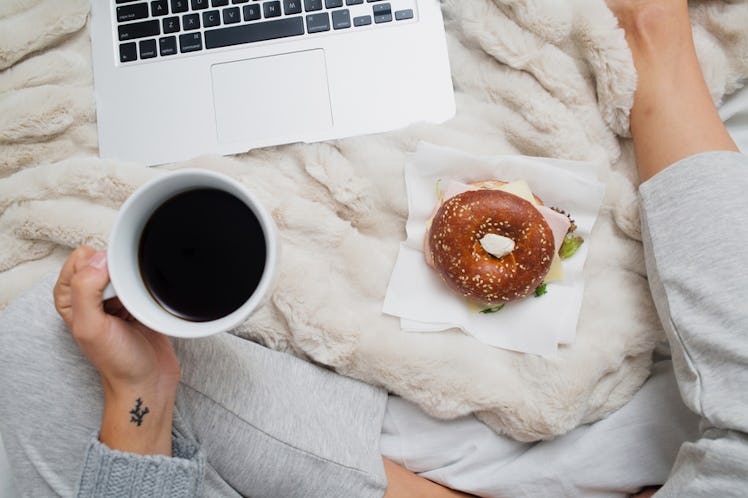
Science Says The More You Snooze, The Healthier You'll Eat, So Go Catch Some Z's
If you’re already stressing over how to accomplish all of your self-care goals not even two weeks into 2018, relax, friend. It turns out, if you listed “sleep more” and “eat healthier” on your New Year’s resolutions, noting one after the other is actually kind of redundant. To be honest, you probably don’t even think about how sleep affects your diet because the benefits get lost in the shuffle. Getting in the recommended six to eight hours of shut-eye every night regulates your entire body, making you feel physically and mentally stable, but it also helps you make smart choices when it comes to your meals.
I’d say "early to bed, early to rise" is generally a good rule of thumb, but sometimes a Netflix marathon or a spontaneous night out with the girls pushes back bedtime. We’ve certainly all been there, but the bottom line is that a lack of shut-eye definitely messes with you come sunrise.
Think about the last time you had to wake up early the morning after a busy night. What were you craving for breakfast? Maybe it was a cinnamon raisin bagel smeared with cream cheese, or an extra large coffee with cream and an artificial sweetener packet or two. Sound familiar? Science says it’s not a coincidence.
According to new research, the more you sleep, the less sugar your body craves.
Visualize the connection between food and sleep like one of those flow charts you used to study in middle school. The kinds of food you eat before you sleep can either muster up bad dreams and interrupt your sleep cycle with indigestion, or ease your insides and keep you dreaming through the night. Likewise, the more soundly you sleep, and the more hours of snooze time you clock in, the healthier your food choices will be the next morning and throughout the day.
It’s fascinating stuff, right? Food fuels sleep, and sleep inspires your food choices. It’s not just a coincidence, either. A study performed by King’s College London recently linked sleep to sugar intake by observing a group of 42 people, half of whom were instructed to sleep an extra hour and a half than usual, while the other half stuck to their normal sleep schedule. The results showed that those instructed to extend their sleep patterns consumed less sugar and carbohydrates than those clocking in the minimum of seven hours.
Dr. Wendy Hall, principal investigator of the study, explained the findings,
The fact that extending sleep led to a reduction in intake of free sugars, by which we mean the sugars that are added to foods by manufacturers or in cooking at home as well as sugars in honey, syrups and fruit juice, suggests that a simple change in lifestyle may really help people to consume healthier diets.
The less you sleep, the more you eat, and it can be a tough cycle to break.
To put it into perspective, your body's ability to function on lack of sleep isn’t too far off from what your body's like after a night of drinking. In order to make up for the absence of energy your body needs to function properly throughout the day, your taste buds are going to steer you in a wrong direction that still feels oh-so-right. In other words, you're going to want all the carbs, all the grease, and a ton of sugar.
In a 2012 Mayo Clinic study, it was found that sleep deprivation causes people to feel almost starved, leading them to eat way more food than their body actually needs throughout the day. You can probably imagine, too, that these peeps aren’t exactly gravitating toward an extra serving of veggies to hold them over.
According to the Huffington Post, a study from the University of Pennsylvania showed that just one night of poor sleep can lead you to crave all the fatty, no-good-for-you foods as soon as you wake up the next morning. Even though you know damn well you should probably stick to a bowl of oats and slices of banana, it’s hard to resist bacon, egg, and oozing, melted cheese on an everything bagel when you’re low on energy and could care less about nutrients. It's rough, I know.
Clearly, the key to achieving the optimal healthy lifestyle is to catch some more Zs.
I don't know about you, but I'm definitely taking this study as a sign to balance my snoozing and eating habits as best as I can. Your sleep schedule and the foods you nourish your body with are two of the most important factors to focus on when striving to achieve an overall healthy lifestyle, and now that we know the two go hand-in-hand, why would you even think to hesitate pressing snooze?
Establishing a nighttime routine can make a significant impact on your physical and mental health. Think about your daily schedule, and narrow down a window of one to two hours you can ideally go to bed. Settle the mind and body with a warm bath, maybe a mug full of moon milk, and perhaps even a gentle yoga sequence to prepare your body for sleep.
Once that's taken care of, it's also a good idea to meal-prep breakfast options for the week that are really healthy, but also super tasty, so even if you don't meet your sleep quota one night, it'll be easier to resist the sugary alternatives when the most important meal of the day is already waiting in your fridge for you to grab and go.
Sweet dreams (and even healthier meals)!